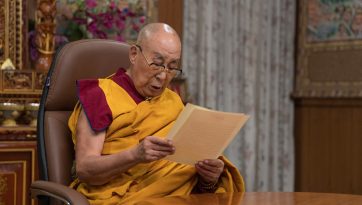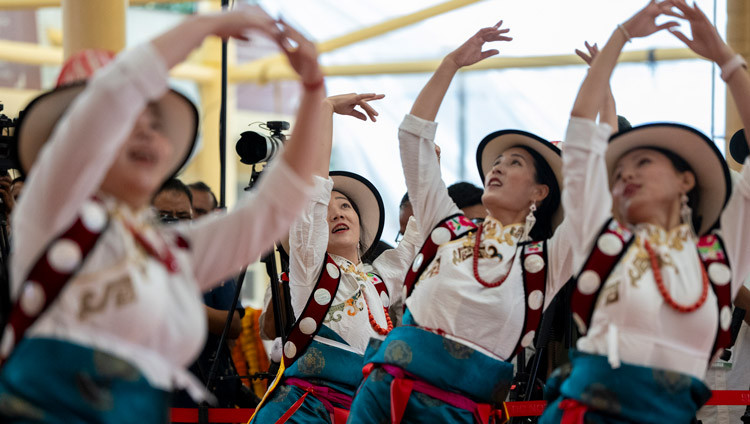Joining the Mani Dhungdrub, the Recitation of Om mani padmé hung
Thekchen Chöling, Dharamsala, HP, India – This morning His Holiness the Dalai Lama came to the Tsuglagkhang, the Main Tibetan Temple, to join in the recitation of ‘mani’ mantras—Om mani padmé hung. This is an event that regularly takes place during the first days of Saga Dawa, the fourth month of the Tibetan calendar, that commemorates the birth, enlightenment and passing away of Buddha Shakyamuni. Monks, nuns and lay members of the local Tibetan and Himalayan community gather in the temple to recite ‘manis’ several million times.
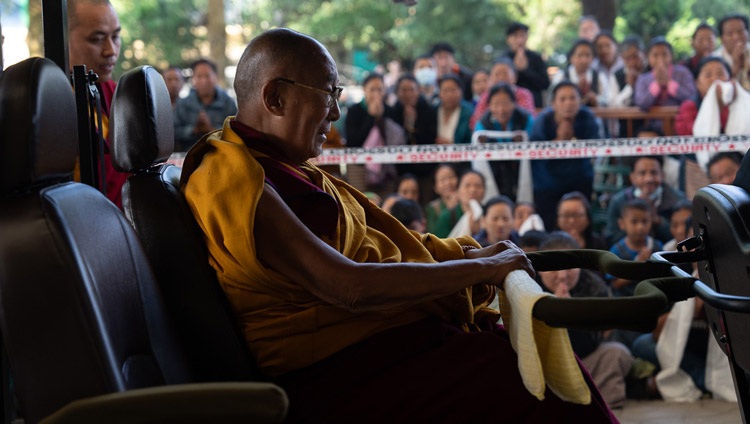
His Holiness the Dalai Lama riding in a golf cart on his way to the Main Tibetan Temple to join the Mani Dhungdrub in Dharamsala, HP, India on May 11, 2024. Photo by Tenzin Choejor
His Holiness took his seat, flanked by the Abbot and Lobpön of Namgyal Monastery, facing the statue of Buddha Shakyamuni and the sandalwood statue of Avalokiteshvara known as the Kyirong Jowo or Wati Sangpo. This is one of three celebrated statues in the presence of which the Great Fifth Dalai Lama undertook an Avalokiteshvara retreat. During the retreat he reputedly saw King Songtsen Gampo emerge from the heart of this Wati Sangpo statue.
After taking part in the ‘Mani’ recitation His Holiness briefly addressed the congregation:
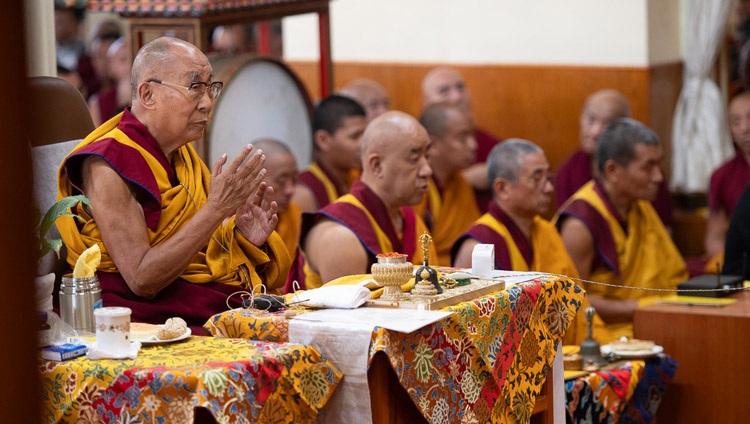
His Holiness the Dalai Lama taking part in mani recitation during the Main Dhungdrub at the Main Tibetan Temple in Dharamsala, HP, India on May 11, 2024. Photo by Ven Zamling Norbu
“Today, people from all walks of life have gathered here to recite the six-syllable mantra of Avalokiteshvara—Om mani padmé hung. He is the supreme deity of compassion and he is Tibet’s patron deity. Everyone, laypeople and monastics, can recite his mantra. Everyone can do that easily.
“I have vivid dreams of the 1000-armed Chenrezig. There is great purpose in reciting the six-syllable mantra, but what is most important is to reflect on the altruistic awakening mind of bodhichitta and to try to gain insight into emptiness. This is what will really please Chenrezig. Simply parroting the mantra, reciting it mechanically without any thought of bodhichitta and emptiness, will not please him.
“Avalokiteshvara has a special responsibility to inspire the people of Tibet and the Himalayan region. If you do your best to cultivate bodhichitta and insight into emptiness, over a period of months and years you’ll see your experience of them will deepen. I cultivate these principles myself and find they really do me good.
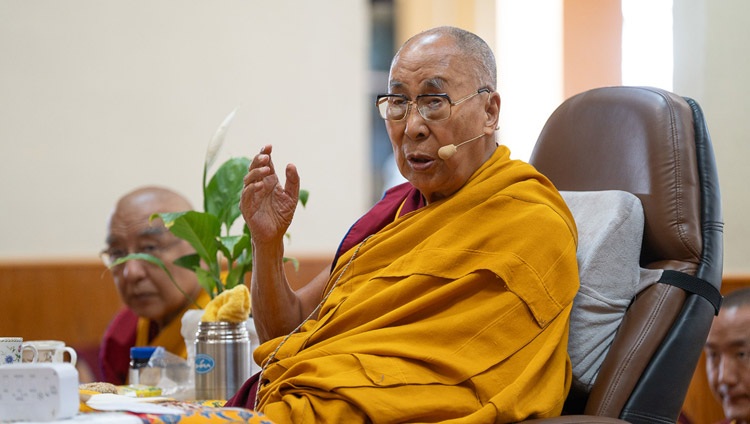
His Holiness the Dalai Lama addressing the congregation during the Mani Dhungdrub at the Main Tibetan Temple in Dharamsala, HP, India on May 11, 2024. Photo by Tenzin Choejor
“My Dharma friends, do your best to meditate on bodhichitta and an understanding of emptiness. Do this every morning as soon as you wake up—you’ll find it’s really beneficial.”
His Holiness then gave a reading of the ‘Supplication to Jowo Wati Sangpo’ that he had written at the request of Dzongkar Choedé Monastery. This is the monastery that the Great Fifth Dalai Lama appointed to provide monks to serve as chaplains to look after the Phakpa Wati Sangpo Temple in Kyirong, a temple that had been established during the time of King Songtsen Gampo. As he read through the prayer His Holiness remarked:
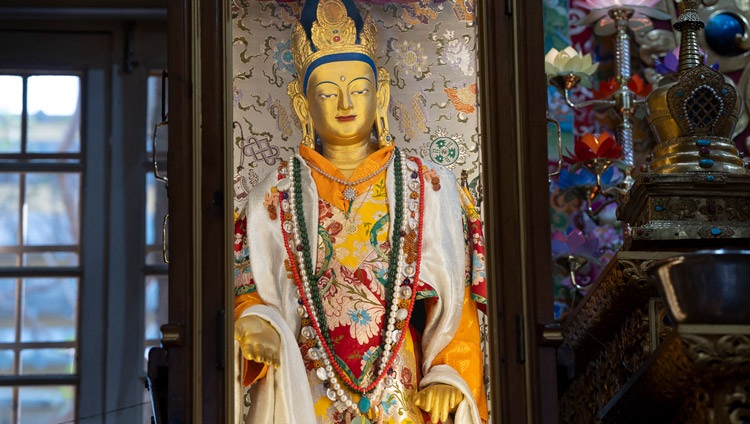
The sandalwood statue of Avalokiteshvara known as the Kyirong Jowo on display during the Mani Dhungdrub at the Main Tibetan Temple in Dharamsala, HP, India on May 11, 2024. Photo by Tenzin Choejor
“Of course, all these enlightened deities are all on the same level of realisation, but Chenrezig has a special connection with Tibet and the Himalayan region and takes care of the people who live there, as this fourth verse says:
Even now, if the people of the Snow Land worship you
And pray to you alone with fervent faith,
Please consider our unbearable suffering,
And lead us out of it with your compassionate hands.”
The prayer concludes, “May an ocean of goodwill spread in all directions,” which His Holiness repeated three times.
“On the one hand,” he observed, “we Tibetans are living in exile, but on the other, there has been an unprecedented growth of interest in Buddhism across the world. This is due to the blessings of Avalokiteshvara. It’s very clear that Tibetans and the Himalayan people are devoted to Avalokiteshvara. Since I was a child, I’ve been reciting his mantra—Om mani padmé hung, as well as Om a ra pa tsa na dhih—the mantra of Manjushri. I have prayed to both Manjushri and Avalokiteshvara that their good imprints would manifest in me and I have constantly sought the blessings of Avalokiteshvara.
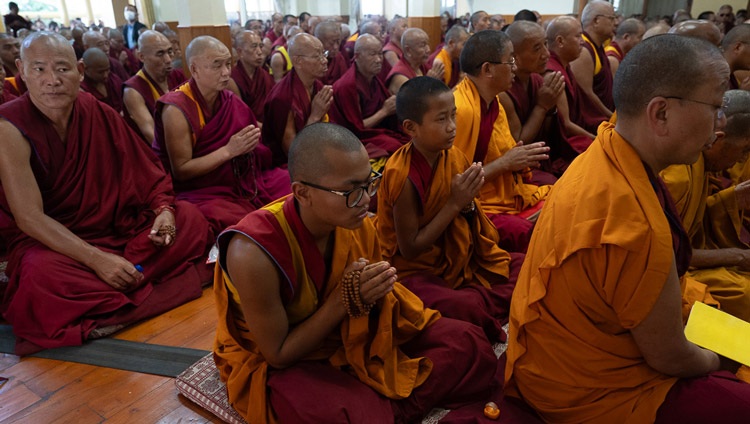
Monks inside the Main Tibetan Temple taking part in the Mani Dhungdrub attended by His Holiness the Dalai Lama at the Main Tibetan Temple in Dharamsala, HP, India on May 11, 2024. Photo by Tenzin Choejor
“Today I urge all of you, monastics and laypeople, to cultivate a good heart, to be kind, whether you believe in religion or not, and to avoid malicious thoughts and greed. You can do this; it’s something relevant to each and every one of us.
“The more we reflect on the awakening mind of bodhichitta and the more we cultivate an understanding of emptiness, the more joyful will be the expression on Wati Sangpo’s face. On the other hand, even if we visualize magnificent wrathful deities with three faces and six hands, there is no guarantee that we will make Wati Sangpo happier. What will make him happy is your doing your best to cultivate the awakening mind and an understanding of emptiness. If you have a kind heart and you help others, it will definitely induce Wati Sangpo to show his cheerful face to you.
“Since I’ve been given the title “Dalai Lama” I try to fulfil the wishes and aspirations of Wati Sangpo. We all have connections with him that continue from life to life. This is why I cultivate bodhichitta and the wisdom understanding emptiness and teach them to my Dharma friends as well. What’s more, I advise people all over the world, even if they have no religious faith, to be kind and compassionate. Today, there are people who, although they had no interest in Buddhism before, now generate an altruistic attitude and meditate on compassion. These are a blessings of Avalokiteshvara and I will continue to serve him to the best of my ability.

Members of the local Tibetan and Himalayan community waiting to see His Holiness the Dalai Lama as he departs after attending the Mani Dhungdrub at the Main Tibetan Temple in Dharamsala, HP, India on May 11, 2024. Photo by Tenzin Choejor
“Buddhism is not a matter of mere faith, it teaches many things for us to think about, which is very important. Therefore, I pray to Wati Sangpo to bless us all, Tibetans and other human beings, who seek peace of mind. There are several billion people in this world, who, whether they are religious or not, try to be warm-hearted in their relations with each other. I request Wati Sangpo to remember them and bless them all.
“That’s all. Tashi delek!”

